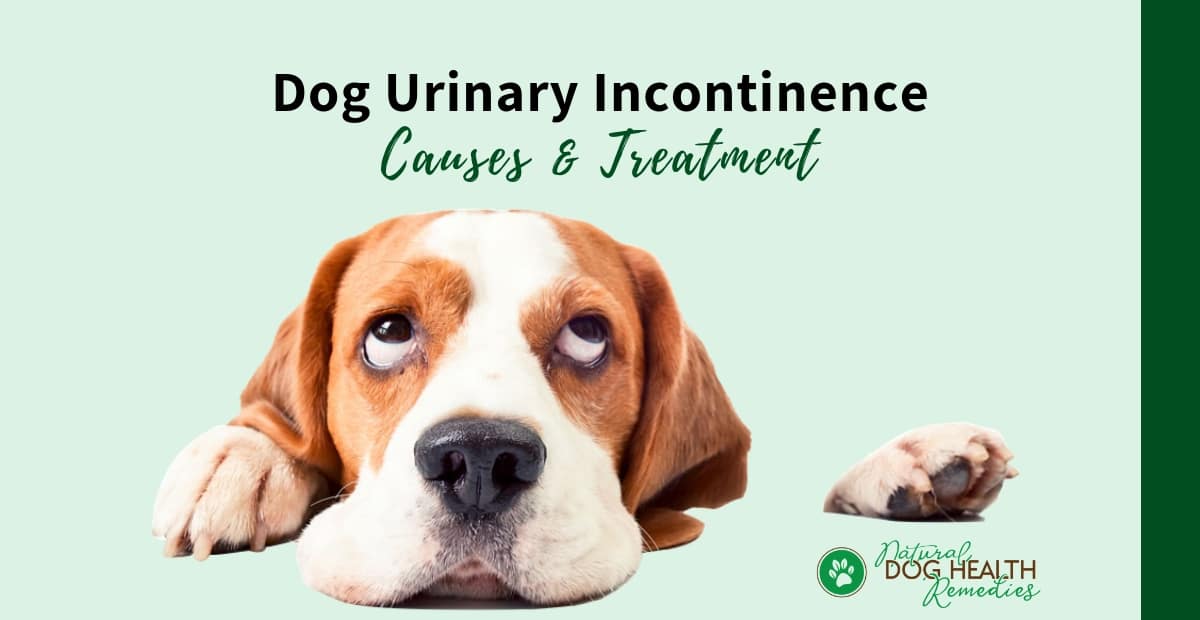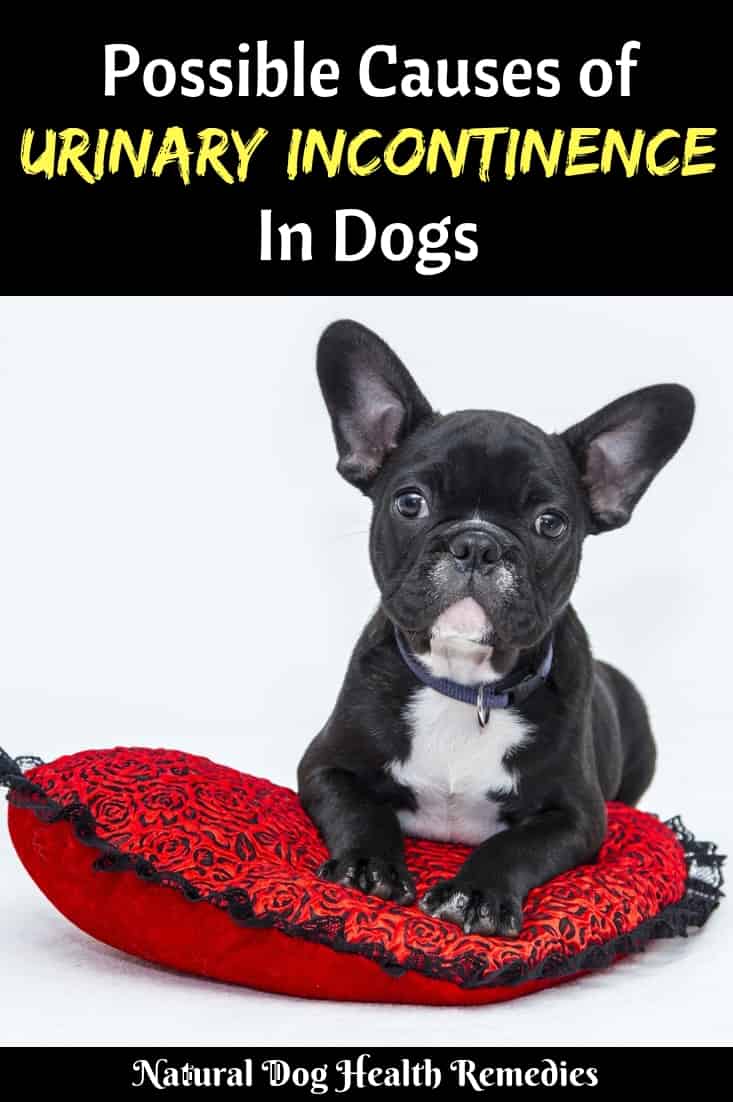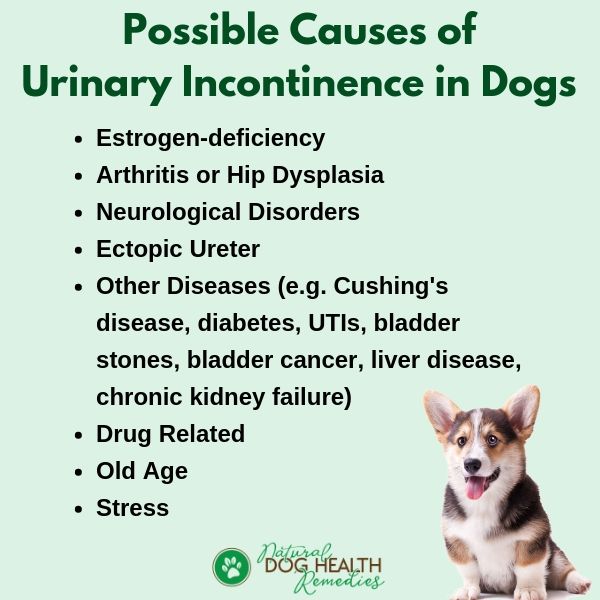Dog Incontinence Causes & Treatment

Overview
Just like us, in dogs, urine is retained in the bladder. During urination, the urine passes to the outside of the body through a small tube called the urethra.
Urinary incontinence is involuntary or uncontrollable leaking of urine from the bladder.
Urinary incontinence in dogs is in fact rather common, especially in certain breeds of dogs, among female spayed dogs, and older dogs.
There are several main causes of dog incontinence, and understandably each requires different treatment.
This article looks at the possible causes of urinary incontinence in dogs and the treatment options.
What Causes Dog Urinary Incontinence?
Here are some causes of urinary incontinence in dogs:
Estrogen-deficiency
This is the most common reason of urinary incontinence in dogs. Many spayed female dogs (and occasionally male neutered dogs) suffer from urinary incontinence because their normal hormone production is interrupted. This type of incontinence is often referred to as "spay incontinence".
The bladder's smooth muscle groups are functionally connected with a balance of reproductive hormones. When a dog's hormonal production is changed, normal functioning of the bladder's muscles is also adversely affected.
If a dog has spay incontinent, she typically "wets her bed" while she is resting or sleeping.
Arthritis or Hip Dysplasia
Dogs suffering from arthritis or hip dysplasia may also develop incontinence because nerve impairment caused by arthritis may also affect the muscle tone and proper functioning of the urinary tract.
If you have an older dog with urinary incontinence, see if he is also showing signs of arthritis.
Neurological Disorders
 Incontinence in dogs can also be caused by neurological disorders, especially in older dogs or epileptic dogs.
Incontinence in dogs can also be caused by neurological disorders, especially in older dogs or epileptic dogs.
Dogs who have suffered trauma to the brain or spinal cord may also develop urinary incontinence. Dogs suffering from neurological disorders may dribble urine either intermittently or constantly, depending on the seriousness of the nerve damage.
If you suspect your dog has neurologic incontinence, look for other signs of nerve-related illness symptoms, such as loss of coordination, fainting, and epileptic episodes.
Ectopic Ureter
Ectopic ureter is a birth defect. It is an abnormally located terminal portion of the ureter.
Instead of the ureter opening in the bladder, it opens in the urethra, vagina, or uterus. The result? Constant dribbling of urine.
This defect is more common in certain breeds, such as Siberian Huskies, Miniature Poodle, Labrador Retriever, Collie, Welsh Corgi, and some breeds of terrier. Also, female dogs are more likely to have this birth defect than males.
Other Diseases
A dog may also develop urinary incontinence as a result of other diseases, such as:
- Cushing's disease
- Diabetes mellitus (sugar diabetes)
- Bladder stones
- Bladder tumor
- Urinary tract infections
- Liver disease
- Chronic kidney failure
Drug-Related
Sometimes some drugs can cause an increase in urine volume. For example, diuretic drugs used to treat heart disease stimulate the kidneys to excrete more urine which may result in incontinence.
Other Possible Causes
- Age: Older dogs sometimes develop a condition called canine cognitive dysfunction which may make them forget about things such as housetraining.
- Stress: If a dog has stress and anxiety, he may lose control of his bladder.

Don't Blame the Dog!
As you can see, there are many possible causes of dog urinary incontinence and we most likely need the help of our veterinarian for a proper diagnosis.
In the meantime, we have to be patient and observant, e.g. We need to look for other illness symptoms or behavioral changes in our dog.
And remember, when "accidents" happen in the house, do not blame or punish the poor dog. It is unfair and ineffective since the problem may be as a result of a medical ailment.

Problems Resulting from Urinary Incontinence in Dogs
Dogs suffering from urinary incontinence often have some related secondary problems. For example:
- Bladder Infections: Incontinent dogs have a much higher incidence of bladder infections.
In incontinent dogs, the muscular tissue at the base of the bladder is not strong and tight enough. Therefore, it is easier for bacteria to migrate up the urethra and colonize the bladder, causing infections.
- Skin Irritations: Dogs with urinary incontinence may be more prone to skin irritations caused by urine scalding. Since urine can burn the skin, if an incontinent dog "wets her bed" and the urine remains in contact with the skin for long periods of time, it can cause severe irritations.
Treatment for Dog Incontinence
Treatment depends on the underlying cause. If the underlying cause can be identified, specific treatment of the cause may resolve incontinence.
For example, surgery can be used to correct an ectopic ureter.
When no specific cause can be identified for the incontinence, drugs are given to increase the tone of the muscles that hold urine in the bladder.
Since hormonal deficiency is a common cause of dog incontinence, hormone replacements or hormone substitutes may be prescribed. For example, one common drug is Diethylstilbestrol (DES), which is a synthetic estrogen medication. DES is considered to be relatively safe in low doses.
Another commonly used drug is Proin® (phenylpropanolamine), which is used to treat dog urinary incontinence brought on by a weakening of the urethral sphincter.
Proin® unfortunately may cause some side effects, such as loss of appetite, restlessness, increased irritability, aggression, increased heart rate, and/or hypertension.
Some dogs may also develop adversed allergic reactions (e.g. hives, swollen lips and tongue, difficulty breathing) to the drug.

Holistic Treatment for Dog Incontinence
Since conventional treatment is not totally satisfactory at times, you may want to consider a more holistic approach to help your dog's incontinence.
Effective natural treatment options such as herbs, homeopathic remedies, and sometimes acupuncture can be used together with, or instead of, conventional medication. Please visit this page for more information.
Eldredge, et al. Dog Owner's Home Veterinary Handbook 4th edition (Wiley Publishing, 2007).
Merck Publishing and Merial. The Merck/Merial Manual for Pet Health (Merck, 2007).
R.H. Pitcairn, The Complete Guide to Natural Health for Dogs and Cats (Rodale, 2005).





